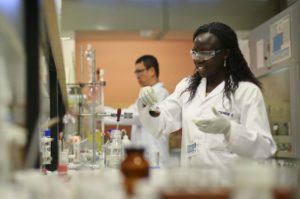
Innovating the future. (EPA/Nic Bothma)
When it comes to scientific research and innovation, Africa is a global laggard. The continent contributes a paltry 1 percent of the world’s research output, a far cry from its position as the world’s second-most-populated continent.
The problem is compounded by low-quality educational curricula and the fact that global funding is skewed more toward health and agricultural development and less so toward science, technology, mathematics and engineering projects. (STEM).
But all is not lost, as more and more African researchers are broadening their horizon and engaging in much-needed projects. These projects tackle issues ranging from food security, energy and transportation to poverty, diseases like malaria and HIV, immunization and challenges stemming from climate change. This has seen the number of papers from African researchers double in just over a decade, improving in quantity, quality and international citation, according to data from Scopus, the largest database of peer-reviewed literature.
Also, an increasing number of institutions, individuals and governments are heralding a new era for scientific research by providing funds for diverse and Africa-specific scientific solutions. These include the Grand Challenges Africa Grants, which this year partnered with the Bill & Melinda Gates Foundation to provide $7 million in grants over the next five years for scientific breakthroughs in maternal health care and precision medicine in Africa.
Then there’s the Kwame Nkrumah Scientific Award from the African Union, which gives $100,000 to top African scientists who provide innovations in life and earth sciences, and the Next Einstein Fellowship, which recognizes and awards Africa’s distinguished scientists under the age of 42.
Top continental and global corporations also have started investing in innovation projects in Africa. In early November, pharmaceutical and consumer goods company Johnson & Johnson announced the launch of its 100,000 Africa Innovation Challenge. Besides early child development, the award focuses on providing solutions for empowering young women and improving family well-being. Five years ago, telecommunications company Etisalat launched its innovation prize that rewards products, services or ideas that promote mobile broadband usage—a key driver of smartphone adoption in the continent. In 2013, IBM opened its first hub in Africa in Kenya, with the aim of driving and supporting homegrown innovation.
Read more here


